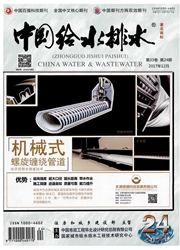

 中文摘要:
中文摘要:
采用人工配制硝酸盐氮废水,对三维电极生物膜反应器进行了低温(10~15℃)条件下的启动研究。挂膜过程在HRT为7h、进水C/N值为2、连续流的条件下,采用0→20mA→40mA→60mA梯度电流驯化方式进行。分析了挂膜过程中氮素的转化,以及微电流作用对反硝化脱氮过程中碳源消耗量和出水pH值的影响,并观察了填料表面生物膜的微生物形态特征。结果表明,经过一个月的驯化挂膜,反应器对硝酸盐氮和总氮的去除率分别可稳定在90%和65%左右;微电流的电化学作用能够有效地缓冲反硝化脱氮系统的pH值,并可增强自养反硝化作用;挂膜完成后,填料生物膜上生长了大量1~2μm的短杆状反硝化菌。
 英文摘要:
英文摘要:
Start-up of three-dimensional electrode biofilm reactor(3D-EBR)was conducted at lowtemperature ( 10 to 15 ℃ ) for synthetic nitrate-nitrogen wastewater treatment. The biofilm was formed at gradient current of 0→20 mA→40 mA→60 mA, HRT of 7 h, influent C/N ratio of 2 and continuous flow. Nitrogen conversion during biofilm formation as well as effect of micro-current on COD consumption and effluent pH during denitrification were analyzed. Morphological characteristics of microorganisms on the biofilm were observed. The results showed that after one month of biofilm formation, the removal rates of nitrate nitrogen and TN were about 90% and 65%, respectively. The micro-current could efficiently buffer pH in the denitrification system and enhance autotrophic denitrification. After the biofilm formation, the dominant bacteria on the biofilm were short rod-shaped denitrifying bacteria measuring 1 to 2 μm in length.
 同期刊论文项目
同期刊论文项目
 同项目期刊论文
同项目期刊论文
 Denitrification of simulated municipal wastewater treatment plant effluent using a three-dimensional
Denitrification of simulated municipal wastewater treatment plant effluent using a three-dimensional Study on a comprehensive evaluation method for the assessment of the operational efficiency of waste
Study on a comprehensive evaluation method for the assessment of the operational efficiency of waste Use of three-dimensional excitation and emission matrix fluorescence spectroscopy for predicting the
Use of three-dimensional excitation and emission matrix fluorescence spectroscopy for predicting the 期刊信息
期刊信息
